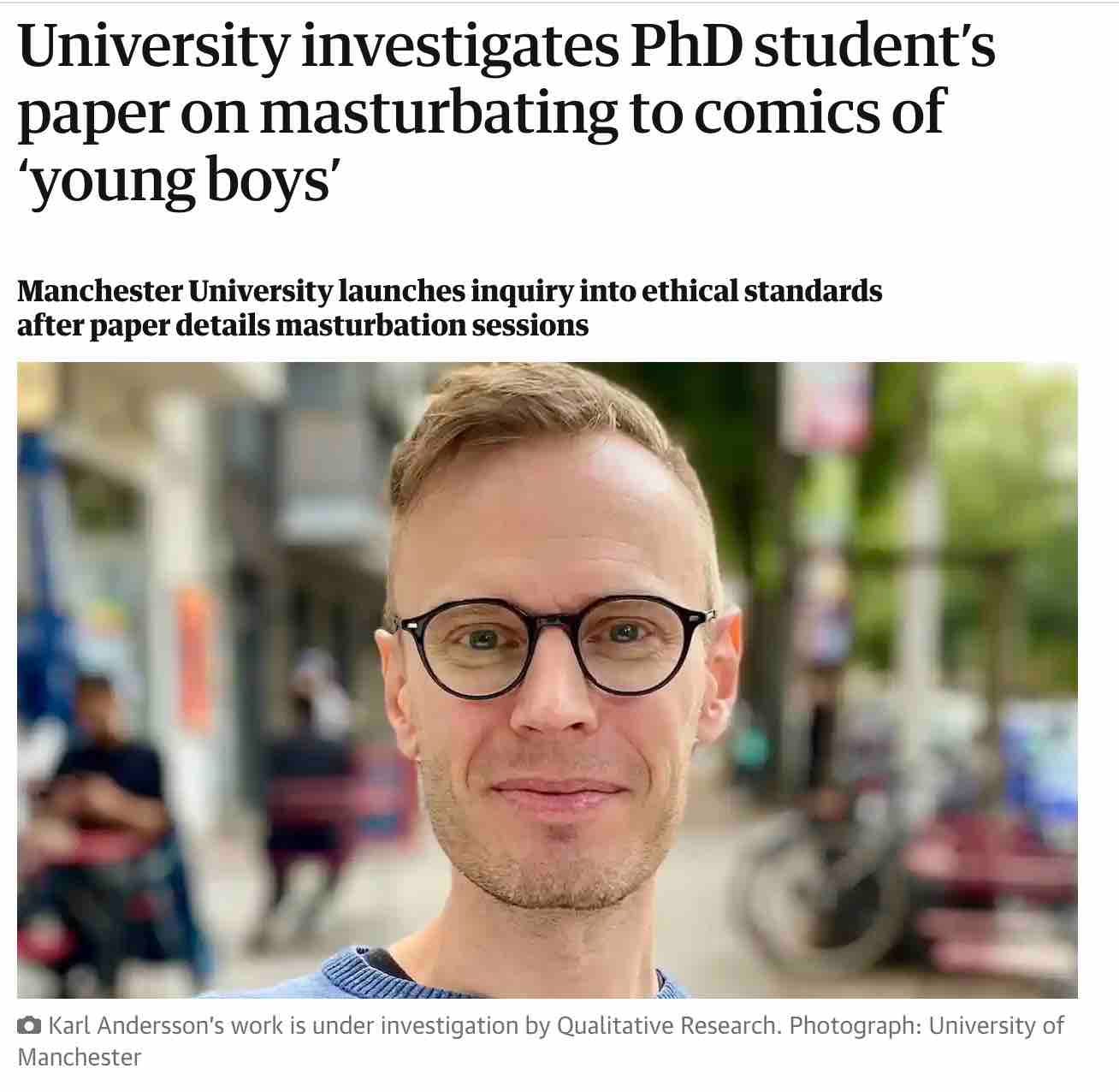If you have been anywhere near Twitter this week, you will have seen the scandal of the masturbation paper. In April, the Qualitative Research journal published an article in which the author described masturbating whilst looking at pornographic drawings of young boys. This was the work of Karl Andersson, a PhD student at the University of Manchester. The paper has now been removed, but multiple press reports exist.
There is little point debating the publication of the article; the consensus is that the paper was sick and unacceptable, falling outside the boundaries of academic freedom. On Thursday, Stuart Ritchie regretted that certain liberals initially defended the paper. Following a critical tweet from a Conservative MP, ingroup heuristics kicked in and they failed to read the paper. Subsequently, most apologized.
Yet Ritchie only briefly reflected on the conditions in which the paper was produced, merely noting that academic gatekeepers had probably paid insufficient attention,
‘The most likely scenario, to my mind, is that [the PhD supervisor, journal editors and peer reviewers] are either well-meaning, or very distracted, or both, and have been taken for a ride by someone who isn’t really interested in research, but merely in finding excuses to examine and publicise his own sexual paraphilia.’
This is charitable. Even if the PhD supervisor was unaware of the paper, the journal editors and peer reviewers do not have this excuse. At the very least, one editor and two peer reviewers would have read the piece thoroughly. Crucially, the paper had been online since 26th April. Qualitative Research is a major journal which is read widely; another paper, published on the same day, has been viewed and downloaded over 500 times. Prior to this week, after which it achieved over forty thousand views and downloads, the masturbation paper probably achieved similar attention. Before the fuss, some even promoted the paper.
This is shocking. Despite the paper’s flagrant promotion of child pornography, about 500 academics saw it and failed to raise the alarm. Therefore, it is important to examine the dynamics within academia which led to this.
As many have observed, there are problems in the areas in which critical theory is dominant. In fields such as gender studies and fat studies, scholars adopt hyper-ideological explanations and use eccentric methods. The autoethnographic method is popular, this involving little more than writing about oneself, many autoethnographies covering bizarre and trite subjects.
Queer theory, a branch of critical theory, has worrying links. Some of the field’s founders apologized for paedophilia and the theory advocates the breaking down of sexual boundaries. This should not be overplayed - the vast majority of critical theorists, including queer theorists, denounced the masturbation paper - yet is undoubtedly relevant. In my opinion, such attitudes and methods were a necessary condition for the publication of paper. In fields with more sober concerns and methods, the paper would never have been produced, let alone published.
But this explanation is insufficient. Given the subsequent revulsion, it is highly likely that some of the 500 scholars who saw the paper were disturbed. Whilst some may have complained to editors/colleagues, any fuss was insufficient to remove the paper. This reveals a deeper problem in universities; academics are extremely reluctant to criticize their ingroup.
Whilst ingroups are ubiquitous – we all have tribes and are reluctant to act against them – they are very prominent within academia. This reflects strong occupational identities and political trends. In recent decades, societies have become more polarized. Academics are more ideologically aware, making these divisions more salient. Generally, there is a view that left-liberals are the ‘good guys’, conservatives being the near exclusive subject of criticism.
When there is conservative malpractice, academics are good at being loudly angry. But when there is left-liberal malpractice, academics tend to be silent. Many think that left-liberal eccentricities should be indulged, not wanting to give conservatives ammunition. Factors such as cancel culture and contractual insecurity exacerbate this; in some departments, atmospheres are stifling.
This explains the silence of the 500 academics who saw the paper. Probably, many were disturbed and embarrassed. Yet because criticism of the ingroup is not the done thing, insufficient criticisms were raised, however gross the infringement. On Twitter, the Oxford sociologist Colin Mills remarked that his longstanding criticisms of critical theory have received little but the cold shoulder. I have had similar experiences. Many academics have spoken out this week, but only after the mood turned against the paper.
Whilst the masturbation paper indicts a specific field – as I said, the concerns and methods of critical theory were a necessary condition for the paper – this trend exists across the sector. The transgender issue is another example. We know that high proportions of academics disagree with the demands of transgender activists; despite this, very few raise a voice. In the UK, many academics were dismayed by the extremism of the Corbyn Labour Party. Yet criticisms were muffled, particularly when Corbyn provided a chance of overturning Brexit.
Perhaps we should not be surprised. Few of us enjoy denouncing our tribe, reflecting our evolutionary programming. But academia has a credibility problem. Many academics proclaim commitment to justice and truth, activism being fashionable. When conservatives do something bad, academics are true to their word, publicly denouncing misdeeds.
But life is more complicated than this; ingroups sometimes do bad things. And if you claim to be an activist who is committed to justice and truth, you should confront your ingroup when they are wrong.




"The autoethnographic method is popular, this involving little more than writing about oneself" - masturbation, IOW
The Culture of Narcissism:
https://en.wikipedia.org/wiki/The_Culture_of_Narcissism
Reminds me of a recent quip made by a girlfriend of my ex - both good Catholics, born and raised in Quebec during the 40s and 50s. She had said that nowadays, many people talk publicly about aspects of their lives that 60 years ago they wouldn't have told their priests in confession.
Not entirely sure that that's much of an improvement ...